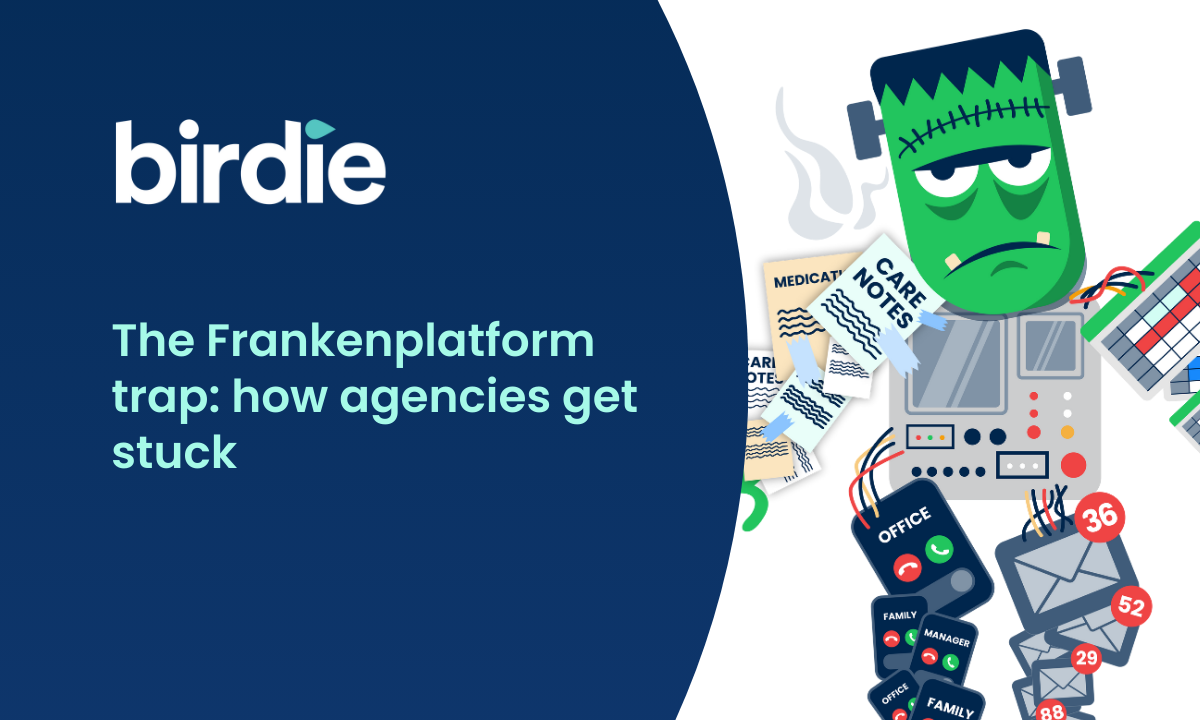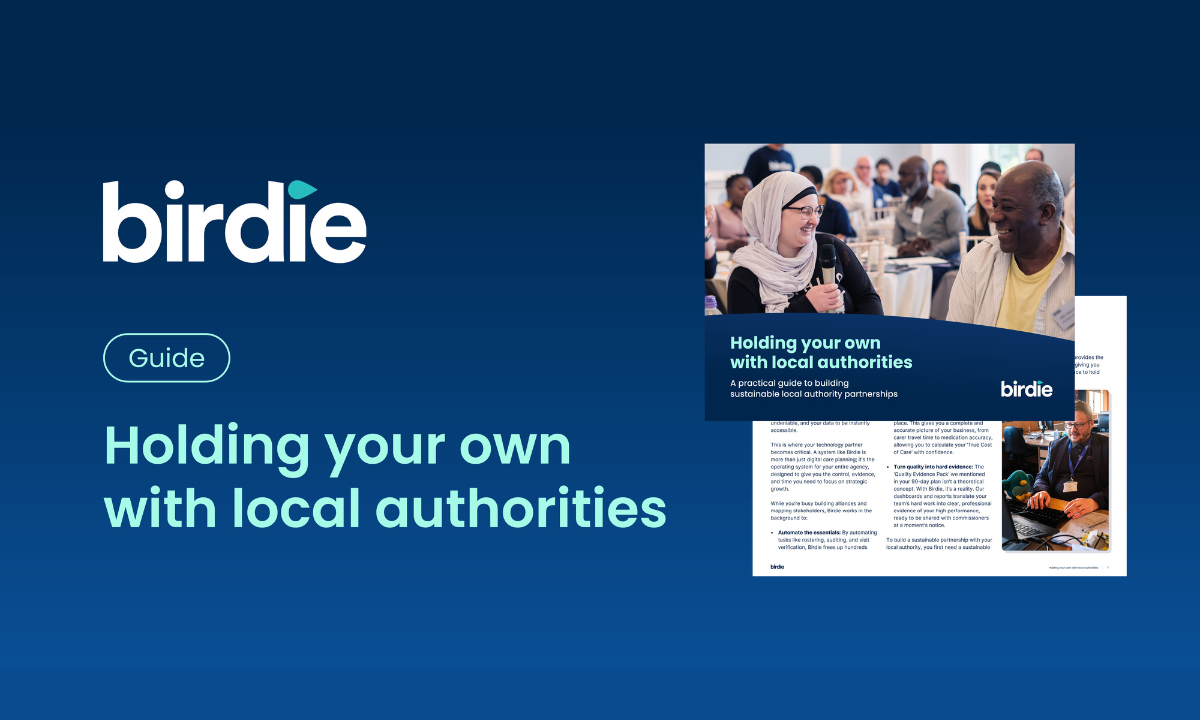Table of contents
On Thursday 8th October, we hosted our third roundtable discussion with industry leaders from the care sector, as part of our 'Future of Homecare' series.
The series has been created to bring together key industry figures to discuss, challenge, and share insights across policy, provision and regulation. At Birdie, we believe that the best way to make progress in social care is to break through the silos and build a coalition of the willing, to drive the changes that are desperately needed.
We were thrilled to welcome Dominique Kent, Chief Operating Officer of Sodexo's home care services and Chair of the United Kingdom Homecare Association (UKHCA), to join our CEO, Max Parmentier, for the discussion. She shared her insights on new models of care and the impact of technology, alongside representatives from organisations including: Right at Home, Clece Care, Home Instead, MiHomecare and others. The discussion outlined some of the critical issues and opportunities facing home care as we move forward in a tech-enabled world - and how we can address them together.
Beyond efficiency: How to harness tech opportunities
We know that technology can reduce admin friction and save time within our individual care businesses. But there are further opportunities to reshape the way we model care, and how we transform care delivery in both the public and private sectors.
To begin, Dominique Kent shared some of her learnings from her career at the Good Care Group. Outlining the ways that they have taken inspiration from not just current care models, but other areas of technology, they have created and built a model that ensures the growth and development of the team, whilst maintaining outstanding outcomes for their clients.
Through implementing a system from within their own CRM tools, the Good Care Group focuses on using assessment data points to create tailored risk interventions, that have seen real outcomes for their clients.
Using an outcomes-based model, that's designed and developed with the end-user in mind, the teams at The Good Care Group have been able to achieve a model that is proactive in delivering care, and focused on better health outcomes from the start.
Sharing some real-life statistics from her business, she explained how the Good Care Group has managed to reduce the risk of falling by 76%, reduce pressure sore rates by 89%, and reduce the rate of emergency response for UTIs by 68%. But, she explained, whilst it is the technology that has given her teams the data they need to evidence and analyse the care they provide, collecting the information itself is only the first step. You then need to make sense of it and optimise it. It's what you do with your people and teams, in response to data, that makes the difference.
The rise of Care Providers 2.0
Older adults are living longer, and the home care market is growing, but budgets in the local authority market are stable, which means there is a higher demand for private healthcare. People paying privately for care have a different level of expectation from their providers, and demand a different type of service. It could be here that we test and demonstrate the impact of technology. We're already seeing it happen with emerging models of care providers: those who are building their own technologies in-house to combat the problems faced by our current models of care - commissioned by the hour or by the task. Cera Care, Honor and Oui Help are just a few who are innovating in this field. They are leveraging technology to save money, increase quality and mitigate risk and above all, increase their revenue.
We also see examples from the US, where insurance models are becoming personalised to older adults - they build a holistic model that focuses on personalising the healthcare journey, and this in turn, leads to reduced costs, better health outcomes and a shorter time in institutions.
How can incumbent providers replicate this?
Technology has been a critical lever in shaping home care markets worldwide. Over the last three years, we have seen increasing adoption of technology in the homecare market. Since COVID-19 this has been further accelerated. Budgets are becoming tied to strict regulations which, in turn, forces providers to adopt technology on a broader scale.
We are seeing a strong push from policymakers and the NHS to focus on preventative healthcare and keeping older adults out of institutionalised care. But that also means we need more sustainable models of care that support a preventive strategy of care at home. Technology is a critical enabler for this to become a reality.
It's a sentiment echoed by Martin Jones, CEO of Home Instead Senior Care, who stated recently: "People's homes are going to be the hospital wards of the future". But, for them to become a place where not only care is delivered, but diagnosed too, we need to harness the opportunities to create full care pathways that align holistically.
What challenges do we need to overcome?
Costs and commissioning
We know that with technology, there is a cost involved and value to be captured. For a wide-scale roll out in the care sector, we have to consider who picks up these costs and who benefits from the value. As Dominique Kent explained, "we have the data and the evidence, but how do we get the health system to invest in quality care? More people need access to services like these, which is why we're keen to roll this out to the healthcare system as a whole."
The challenge lies in the current commissioning-based model - this current model of allocating care is not equipped to deliver tech-enabled, outcomes-based care. We need to shift perceptions if we are to move towards models of care that put outcomes at the core and rely on technology, alongside human intervention, to deliver them.
We know that commissioning and modelling care on a 'pay-per-task' basis isn't working. So how can we change that?
Max Wurr, Director of Policy and Communications at City and County Healthcare Group, suggests that "those who serve the public sector are so beholden to the local authorities. They dictate the market, opportunities, service and innovation." It's echoed by Anne-Marie Perry, MD of Abicare Services Ltd, who believes that "what's killing innovation is the world of contracting. There is no room for innovating in the industry because it always ends up being time and task-based. After all, that's how we can calculate income. No one has the brain space or time to think about innovation because we're so consumed with meeting contracts."
Age and skill bias
There’s a concern that clients (and care staff) may not be comfortable with the adoption of tech, and that a lack of ability means we can’t roll out technology on a wide-scale. However, this opinion is challenged by Martin Jones, who made the point that: "For too long, we have been bound by the age-biased, patronising views that our clients can't embrace these new ways of working. When actually they have gone through telephones, motor cars, aeroplanes, the internet, world war - far more innovation than we have ever experienced."
We also know that concerns about the adoption of tech in the workforce are often marked as a blocker. Jenny Jones, Head of Systems and Development at Right at Home, suggested that addressing the technical capabilities of our workforce could be the first place to start. She stated: "Our schools are not educating the future of our workforce to drive forward with a tech agenda. COVID-19 has shown that people can adopt tech, but sometimes we see that the workforce is in control of the office team, not the other way around. There is a huge post-COVID labour market that we could tap into for care teams, but it's about ensuring the right education to equip them for a tech-enabled career. All too often, the struggles tend to fall at the level of the workforce."
At Birdie, we believe that technology doesn’t have to be a blocker in terms of skill. We’ve seen first-hand how care staff of all ages and abilities can get on board with the right technology - if it’s been built in the right way. We need to ensure that as more and more tech providers enter the market, that systems are designed for the user. That way, we can eliminate the issues that arise from tech aversion or fear. If the technology is too difficult to understand or isn’t intuitive to the user, we will fall at the first hurdle, so it has to be accessible from the start.
We also know that when it comes to tech systems, we need to go beyond just digitising the paper notes that we’re used to. Data collection for the sake of collecting data is not working. As Dominique Kent mentioned, we need to focus on how we turn the information we have into meaningful actions within our workplaces.
Mike Smith, Owner and Managing Director at Trinity Homecare, also highlighted this essential skill: "One of the skills we're missing is turning the richness of data into something meaningful. How can we turn that data into insights and get it together in a collective way and tell stories? Whether that's to consumers to win headlines, or to commissioners to build better models."
Our vision at Birdie is to use the data we collect to build stories that help care staff to act upon them and make better decisions. Instead of navigating a sea of charts and numbers, we can turn our data into real-life insights that provoke a response, turning information into action. If we frame data differently, we know that it will be easier to adopt, digest and understand for everyone.
Leadership and coordination
Martin Jones elaborated on further problems with leadership: "We are 20 years behind in terms of our data and our way of working as a group. There isn't one view that is shaping the government and the future at the moment." But how can we (as a care sector) be heard? Short of staging a protest on Waterloo Bridge, as Dominique Kent jokingly suggested, we need to move forward as a sector and use technology as an asset to our incredible and resilient teams.
Jonathan Vellacott, Executive Chairman at MiHomecare and Executive Chairman at Complete Care, echoed a sentiment that many of us feel in the care industry: "We are never going to get leadership from central government or local authorities. We need to take direction ourselves. The state-funded sector isn't engaged in looking at the outcomes and what happens next. We need to change the agenda, and it comes from within. Between us, we have the technology, but we need to get the dialogue going."
We know that changing an industry won’t be easy, but we hope that these Birdie roundtable events will help us to begin the dialogue and move the conversation forward. By highlighting the viewpoints of those on the ground, we’re working towards a united front for our industry, starting with these discussions.
Given those challenges, our first priority has to be to demonstrate the impact of technology.
As we mentioned, there are some wonderful examples of private care businesses like The Good Care Group and Cera Care, delivering outcomes-based, person-centred care, backed by technology and data-driven insights. But our challenge is not in realising the benefit of this ourselves; instead it’s in how we encourage our governments and local authorities to harness this and change their methods of commissioning. To do that we need to demonstrate the benefits.
Max Wurr stated: "At present, the home care industry is fighting the fire at the end of the problem. We need to be a part of a solution that prevents and supports them before they get to that place. People crash into social care when they need it, but there is little understanding of the sector and the ways it's funded. We need to do better at education and raise awareness for the public. We know that people don't want to engage with the idea of their infirmity, so instead, we need to be framing later life as a time of opportunity and a time of independence. We don't just want to be a safety net for the decrepit."
The current commissioning-based model of allocating care is not equipped to deliver tech-enabled, outcomes-based care. We need to shift perceptions if we are to move towards models of care that put outcomes at the core and rely on technology, alongside human intervention, to deliver them.
There is an opportunity to highlight the successes of those in the private market and through this, roll-out these models to everyone. But we have to start somewhere. As we discussed, we cannot rely on local authorities and governments to lead the change. Instead, it must come from within, and we must build our own systems for outcomes-based care.
We can start to do this by creating stories and adapting the ways we talk about technology. By building real-life case studies with the evidence we have, we can show the impact of technology in a way that goes beyond just numbers. We can begin to explain the effects of outcomes-based care by using the successes we’ve seen in small-scale settings. Then, we can begin to show the impact of this at scale. By building a dialogue that puts people at the core and hinges on the real successes we’ve already seen, we can start to weave technology into the conversation from the start.
As we prove the impact, it's important to take people on the journey with us.
Darren Guy, UK Director at Kare Plus, thinks that we can harness the opportunities by taking people on the journey with us. “The mere mention of changes in technology can scare people, so we need to figure out a way to get people excited about it. We need to spot where the resistance is, and change perceptions. We need to focus on joint-partnership working and get the key people to come along with us.” Dominique Kent echoed this sentiment and shared with us the key to success in her business was to ensure that her care staff, clients, and family members joined the journey with her business - each having their say and being involved from the start.
We know that COVID-19 has had a substantial impact on technology adoption in the sector, and this gives us an excellent opportunity to start the process. We need to continue these conversations and lead by example. We need to bring technology into the core of care and demonstrate the benefits. We should then use this evidence to tell stories of change that will penetrate minds and change behaviours. We must also harness the opportunities that COVID-19 has bought us in terms of employment. Christina Bassadoni, Founder & CEO at Guardian Angel Carers, mentioned: "[Before COVID-19] the biggest inhibitor to growth has been the number of staff available. Since the pandemic, people are proud to care.” With this increased talent pool, we can move forward with technology in ways we would never have previously thought possible.
Suppose we can start to integrate technology into the conversation and position it as an enabler, rather than a replacement of human-intervention. In that case, we can begin to shape the discussions with the policymakers and authorities that regulate and govern care.
In summary
We know that there are a wealth of opportunities available if we are open to exploring them. We already see success with tech-enabled care providers, so now is the time to capitalise on this and show our governments and local authorities the possibilities for care that’s backed by technology. We are not seeking to remove people from the equation; instead, help them make better decisions, backed by information and analysis that can be aggregated and structured by digital platforms.
True, outcomes-based care can only be rolled out once we, as a care sector, begin to understand and use the data correctly - an agenda that must be driven from the inside out. Once we have the tools and the ability to harness it correctly, we can lead the change for governments and local authorities. With this data and insight, we can build our stories and bring everyone, from our customers and staff to local authorities, on the journey with us. We’re already taking steps, but in such a vast, fragmented industry, the change needs to happen simultaneously, among the major players. These roundtable discussions are just the start of that, and we hope that by fostering debate and encouraging innovation, we can start the movement.
Wrapping up
Birdie would like to extend a warm and heartfelt 'thank you' to Dominique Kent for a very enlightening discussion. We would also like to thank all the Homecare Leaders who joined us for this session in our Future of Homecare Series.
We'll be running these sessions regularly, so be sure to keep an eye on our social channels: Twitter, Facebook, Linkedin & Instagram.
Published date:
October 29, 2020
Author:
Emma-Lee Curtis
















.svg)